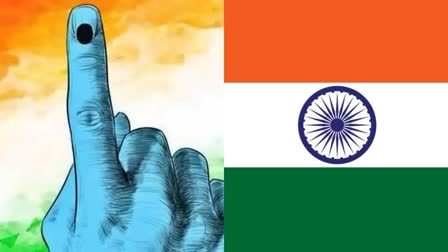The ruling BJP on Thursday took a major step to implement its key plank of “one nation, one election” as the Union Cabinet headed by Prime Minister Narendra Modi approved the constitutional amendment bill to roll out the concept of simultaneous Lok Sabha and state assembly polls, sources said.
Two draft legislations, including one simple bill to amend provisions in laws dealing with three Union territories with legislative assemblies to align them with the Constitution amendment bill, were given the nod by the Cabinet.
While a high-level committee led by former president Ram Nath Kovind on simultaneous polls had also proposed holding the municipality and panchayat elections along with the national and state elections in a phased manner, the Cabinet has decided to stay away, “as of now”, from the manner in which local body elections are conducted, the sources said.
A source said the prime minister put a strong emphasis on the need for simultaneous polls for further boosting development initiatives and overall growth, points he has often made since he first made an energetic pitch for the concept in December 2016.
The proposed bill will require a simple majority for passage in both the Houses. The government is keen on holding wider consultations on the bills and may send them to a parliamentary committee.
The BJP’s manifesto for the 2024 Lok Sabha polls had included its commitment to the idea.
Though BJP’s allies such as the TDP, Janata Dal (United), and Lok Janshakti Party (Ram Vilas), all of whom are represented in the Union Cabinet, are supporting the concept, the National Democratic Alliance will need backing from some of the members of the opposition INDIA alliance besides fence-sitters to ensure the passage of the constitutional amendment bill requiring support from two-thirds of the members in both Lok Sabha and Rajya Sabha.
The NDA’s current strength in Lok Sabha, which currently has 542 members and one vacancy, is around 293 against the two-third mark of 361. The INDIA bloc enjoys support of nearly 235 MPs.
In Rajya Sabha, the ruling alliance has nearly 122 members, a tally which is set to rise after the ongoing process to fill vacancies are over. The Upper House’ sanctioned strength is 243.
LJP leader and Union Minister Chirag Paswan told reporters that the process to implement simultaneous polls has formally begun, a nod to its approval by the Cabinet, asserting that this is in the interest of the country’s development.
Frequent polls are a hinderance to development works, he added.
Union minister and BJP leader Ashwini Vaishnaw said at a media event that it is a “very positive thought” and very good for the country. However, he made no reference to the Cabinet’s approval of the bill.
As of now, the Cabinet has given its nod to draft legislations to hold simultaneous polls to the Lok Sabha and legislative assemblies only, the sources said.
The Constitution bill proposed by the Kovind panel was aimed at creating provisions to hold simultaneous elections to municipalities and panchayats, along with the elections to the Lok Sabha and state legislative assemblies, by inserting a new Article 324A.
It would have required ratification by half of the state assemblies. But the Union Cabinet has kept the local body polls out as of now.
The second bill, a necessary formality to go with the main draft legislation, will be an ordinary one to amend provisions in three laws dealing with Union territories that have legislative assemblies — Puducherry, Delhi and Jammu and Kashmir.
The statutes it proposes to amend are the Government of National Capital Territory of Delhi Act-1991, the Government of Union Territories Act-1963 and the Jammu and Kashmir Reorganisation Act-2019.
The sources said the government also wants to consult the speakers of various state legislative assemblies through the committee.
The government is likely to introduce the bills early next week in Lok Sabha, and the draft legislation for constitution amendment could be named as “The Constitution 129 (Amendment) Bill”, the sources said.
Home Minister Amit Shah also spoke on the bill, which was not part of the listed agenda, during the Cabinet meeting.
Since a single electoral roll is used by the Election Commission to hold Lok Sabha and assembly polls, the proposed bill does not refer to a common electoral roll.
A common electoral roll was proposed by the Kovind panel to hold Lok Sabha, assembly and local body polls together.
Since the Cabinet decided not to bring a bill to hold local body polls with parliamentary and assembly polls, there is no need to amend constitution at this stage to go for a common voters’ list, they noted.
The BJP ally JD(U) had earlier demanded to not include local body polls as part of the simultaneous elections.
Moving ahead with its “one nation, one election” plan, the government in September had accepted the recommendations of the high-level committee for holding simultaneous polls for the Lok Sabha, state assemblies and local bodies in a phased manner.
In its report submitted to the government in March, just before the general election was announced, the panel recommended implementing “one nation, one election” in two phases.
While the ruling BJP and its allies are pushing for simultaneous polls, several opposition parties have opposed the idea.
The government is of the view that simultaneous polls will reduce expenditure in the long run and different parts of the country will not be under the Model Code of Conduct throughout the year due to various polls.
Simultaneous polls were held in the country between 1951 and 1967. The concept of simultaneous elections has featured in many reports and studies since 1983, essentially implying a return to the previous practice of conducting polls concurrently.




